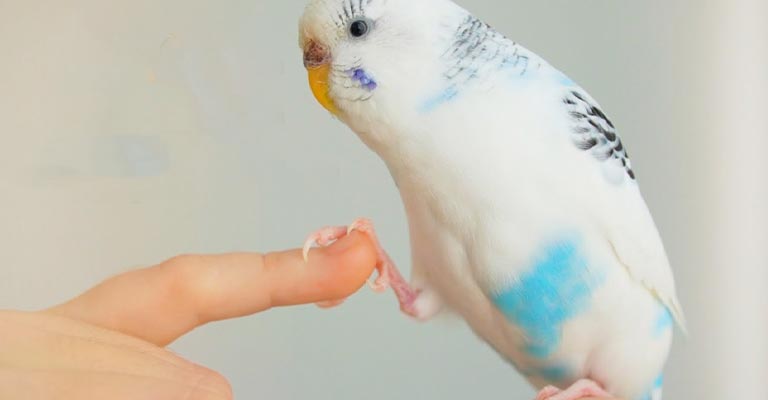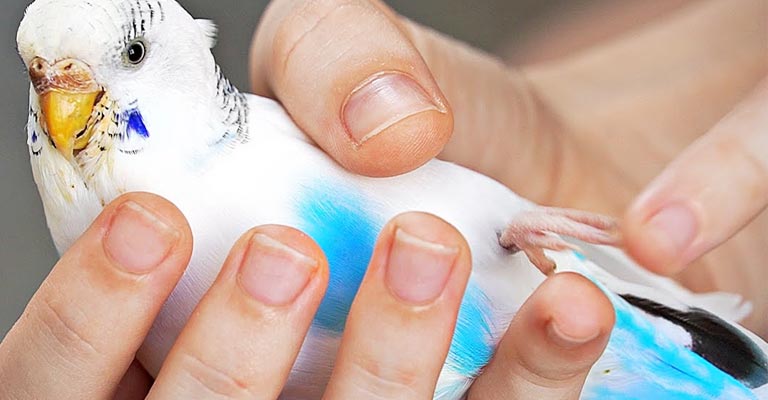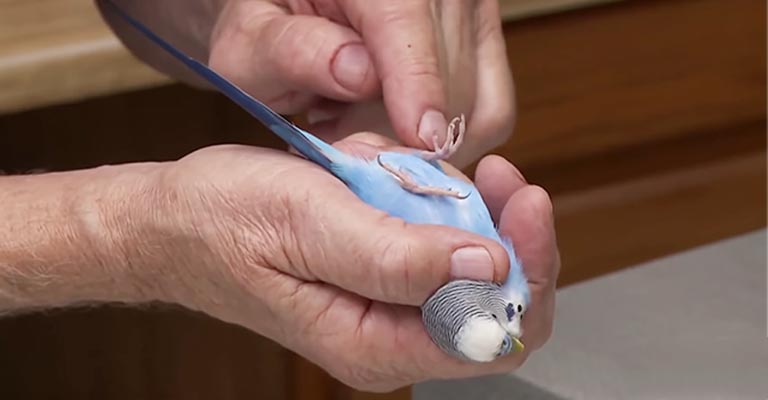Parakeet foot problems are a common issue among parrot owners, and it is important for parakeet owners to be aware of the symptoms, causes, and treatments for these problems.
These foot problems can range from minor swelling and redness to chronic abscesses, and if left untreated, can lead to serious health issues for your pet parakeet.
Symptoms of parakeet foot problems can be subtle and may not be immediately apparent to owners.
It is important for parakeet owners to be aware of the signs and symptoms of foot problems, such as swelling, redness, and chronic abscesses, and to seek treatment from an avian vet as soon as possible.
The causes of parakeet foot problems can range from inappropriate perches, poor nutrition, and injuries. Certain types of perches, such as dowel rods and PVC pipes, can lead to foot problems, as can poor nutrition and injuries caused by other pets or cage design.
Treatment for parakeet foot problems may include antibiotics, surgery, providing appropriate perches, and maintaining a clean cage. It is important for parakeet owners to address foot problems as soon as possible to prevent them from becoming more severe.
In this blog post, we will discuss the symptoms, causes, and treatment options for parakeet foot problems. We will also provide tips on how to prevent and manage these problems so that your pet parakeet can live a happy and healthy life.

Symptoms of Parakeet Foot Problems
Parakeet foot problems can manifest in a variety of symptoms, some of which may not be immediately apparent to owners.
The most common symptoms of parakeet foot problems include:
Swelling
One of the most obvious signs of a foot problem is swelling or inflammation of the foot or toes. This can be caused by a variety of issues such as infection, injury, or chronic irritation.
Redness
Another common symptom of a foot problem is redness or discoloration of the foot or toes. This can be a sign of inflammation, infection, or injury.
Chronic abscesses
Abscesses are pockets of pus that can form on the feet of parakeets. They can be caused by a variety of issues such as infection, injury, or chronic irritation. Chronic abscesses can be a sign of a more serious underlying problem and should be evaluated by a veterinarian.
Lameness
Parakeets with foot problems may have difficulty standing or walking. This can be a sign of an injury or infection and may indicate that the bird is in pain.
Loss of Feathers
In some cases, feather loss on the feet and legs can occur as a result of foot problems. This can be caused by chronic irritation or infection.
It’s important to note that some of these symptoms, such as feather loss, may not be immediately apparent to owners, and it’s important to regularly check your bird’s feet and legs for any signs of abnormalities.
If you notice any of these symptoms or suspect that your parakeet may have a foot problem, it is important to seek treatment from an avian vet as soon as possible.
Causes of Parakeet Foot Problems

Parakeet foot problems can have a variety of causes, including inappropriate perches, poor nutrition, and injuries.
Inappropriate Perches
Certain types of perches, such as dowel rods and PVC pipes, can lead to foot problems in parakeets. These perches are too smooth and round and can cause irritation and pressure sores on the feet.
It is important to provide a variety of perches with different textures and sizes for your parakeet to use. Wooden perches that haven’t been treated with chemicals are the best option for your parakeet.
Poor Nutrition
Poor nutrition can also contribute to the development of foot problems in parakeets. Nutritional deficiencies can cause weak bones, making the bird more susceptible to injuries and infections.
Feeding your parakeet a balanced diet that includes a variety of fruits, vegetables, seeds, and fortified pellets is important for maintaining their overall health.
Injuries
Injuries can also lead to foot problems in parakeets. The most common injuries include getting a toe stuck in the cage or being grabbed by another pet.
These injuries can cause swelling, redness, and chronic abscesses. Additionally, injuries can also cause lameness, which can make it difficult for the bird to stand or walk.
It’s important to note that some parakeets are more susceptible to foot problems due to underlying health issues, such as arthritis or diabetes. In such cases, treating the underlying condition is crucial to managing the foot problem.
In any case, it’s important to seek treatment from an avian vet as soon as possible to prevent the issue from becoming more severe.
Treatment of Parakeet Foot Problems

Treatment for parakeet foot problems is important for maintaining the overall health and well-being of your pet. It is essential to seek treatment from an avian vet as soon as possible to prevent the problem from becoming more severe.
Antibiotics
If the foot problem is caused by an infection, antibiotics may be prescribed to treat the infection. The vet will likely take a culture of the affected area to determine the specific type of bacteria causing the infection, and will then prescribe an appropriate antibiotic.
Surgery
In some cases, surgery may be necessary to treat foot problems. For example, if an abscess is not responding to antibiotics, surgery may be needed to drain the abscess and remove any foreign material or dead tissue.
Perches and cage maintenance
Providing appropriate perches and maintaining a clean cage is important for preventing and managing foot problems.
As previously mentioned, wooden perches that haven’t been treated with chemicals are the best option for your parakeet. Clean the cage and perches regularly with avian-safe cleaners, such as F10 SC, to prevent infection and avoid the accumulation of bacteria and fungus.
Prevention
To prevent foot problems, it’s important to provide your parakeet with a variety of perches with different textures and sizes, to feed a balanced diet, and to keep the cage and perches clean.
Early Detection
It’s important to address foot problems as soon as possible to prevent them from becoming more severe.
Regularly check your bird’s feet and legs for any signs of abnormalities and seek treatment from an avian vet if you suspect that your parakeet may have a foot problem.
In summary, parakeet foot problems can range from minor swelling and redness to chronic abscesses, and if left untreated, can lead to serious health issues.
Treatment for foot problems may include antibiotics, surgery, providing appropriate perches, and maintaining a clean cage.
It’s important to seek treatment from an avian vet as soon as possible and to address foot problems as soon as possible to prevent them from becoming more severe.
“Parakeet Foot Problem Comparison”
| Problem | Symptoms | Causes | Treatment |
|---|---|---|---|
| Swelling | Inflammation of the foot or toes | Infection, injury, or chronic irritation | Antibiotics, surgery, appropriate perches, clean cage |
| Redness | Discoloration of the foot or toes | Inflammation, infection, or injury | Antibiotics, surgery, appropriate perches, clean cage |
| Chronic abscesses | Pockets of pus on the feet | Infection, injury, or chronic irritation | Antibiotics, surgery, appropriate perches, clean cage |
| Lameness | Difficulty standing or walking | Injury or infection | Antibiotics, surgery, appropriate perches, clean cage |
| Loss of Feathers | Feather loss on the feet and legs | Chronic irritation or infection | Antibiotics, surgery, appropriate perches, clean cage |
FAQs
It is recommended that you check your parakeet’s feet and legs for any signs of abnormalities at least once a week. This can be done during regular cage cleaning or while interacting with your bird. If you notice any signs of foot problems, such as swelling, redness, or chronic abscesses, it is important to seek treatment from an avian vet as soon as possible.
It is not recommended to treat a parakeet foot problem at home. Foot problems can be caused by a variety of underlying issues, and it is important to seek treatment from an avian vet to determine the cause and provide appropriate treatment. Home treatment can be harmful, and may lead to complications.
Yes, parakeet foot problems can be prevented by providing appropriate perches, maintaining a clean cage, and feeding a balanced diet. Regularly check your bird’s feet and legs for any signs of abnormalities and seek treatment from an avian vet if you suspect that your parakeet may have a foot problem.
There are over-the-counter products such as creams and ointments that can be used to treat minor foot problems, but it is important to seek advice from an avian vet before using any products as some can be toxic for parakeets. The best way to address a foot problem is to seek treatment from an avian vet.
Some foot problems can be contagious, such as those caused by bacterial or fungal infections. It is important to keep the affected bird isolated and to thoroughly clean and disinfect the cage and surrounding area to prevent the spread of infection.
Editor’s Note
It is important to take your bird to an avian vet as soon as possible as it could be a serious injury or an underlying health issue. The symptoms you are describing could be caused by bumblefoot, an inflammatory or degenerative foot condition, or it could be an injury.
It is also possible that the bird has an abdominal tumor. It is important to have a vet examine the bird to determine the cause of the symptoms and provide appropriate treatment. In the meantime, ensure that the bird has appropriate perches and a clean cage, and avoid using any galvanized metal as it can be toxic to parrots.
Conclusion
Parakeet foot problems are a common issue among parrot owners and it is important for parakeet owners to be aware of the symptoms, causes, and treatments for these problems.
These foot problems can range from minor swelling and redness to chronic abscesses, and if left untreated, can lead to serious health issues for your pet parakeet.
Symptoms of parakeet foot problems can be subtle and may not be immediately apparent to owners. The causes of parakeet foot problems can range from inappropriate perches, poor nutrition, and injuries.
Treatment for parakeet foot problems may include antibiotics, surgery, providing appropriate perches, and maintaining a clean cage.
It is important for parakeet owners to take their bird’s foot health seriously and to be aware of the signs and symptoms of foot problems.
Regularly check your bird’s feet and legs for any signs of abnormalities and seek treatment from an avian vet if you suspect that your parakeet may have a foot problem.
Early detection and treatment are key to preventing and managing parakeet foot problems and will ensure that your pet parakeet can live a happy and healthy life.